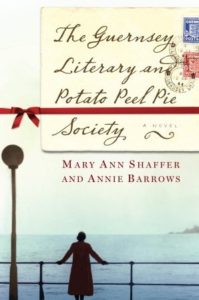The Guernsey Literary and Potato Peel Pie Society
By Mary Ann Shaffer and Annie Barrows.
Reviewed by Kristy Dolson.
When I began writing this article, a mere three days before the deadline, the world was still deep into its COVID-19 lockdown. South Korea’s government was still encouraging citizens to social distance and stay home despite the long weekend created by Buddha’s Birthday and Children’s Day. I myself had planned a trip to Vancouver and was working through a mild depression brought on by the cancellation and subsequent feelings of isolation and loneliness.
But I had to push those feelings aside and face the reality. I could not get on a plane to Vancouver to meet my best friend. But I could still text and video call with my loved ones. I could still put my energy into passion projects. I could still write and read and declutter my apartment. I could reflect on the past month of turbulence and make a plan for how the next month was going to be better. It is in that spirit that I bring you a review for The Guernsey Literary and Potato Peel Pie Society by Mary Ann Shaffer and Annie Barrows.

In this book I found solace. It is a celebration of the written word and our desire for stories and art to lift us up out of the chaos and uncertainty of war and what comes after. Mainly, it is a book about individuals in a community coming together to survive and renew themselves during a time of crisis. Guernsey is one of the Channel Islands, a self-governing British Crown dependency. During WWII, the Channel Islands came under German occupation and the citizens were isolated from the outside world for nearly five years. This is a historical novel that fictionalizes the occupation, but succeeds in recollecting and reframing the history, memory, guilt, trauma, and compassion of a community in the aftermath of WWII.
The story revolves around London-based author Juliet Ashton, who made a name for herself during the war by writing a recurring humor column about a fictional war journalist. Now that the war has passed, Juliet struggles to find a new source for her writing. One day, she receives a letter from a man on Guernsey and learns of how the islanders’ rebellious act against the Germans brought a fractured community back together. Her writing and personal interests piqued, she begins corresponding with a few members from the titular Guernsey Literary and Potato Peel Pie Society. Through her correspondence and eventual visit to the island, Juliet discovers material for her next book – and for her own future.
I did not know anything about the occupation of the Channel Islands, so I was very interested by all the well-researched details that were in the book. They come from a wide variety of perspectives, as the authors introduce many characters, each one a fully fleshed-out human personality that jumps off the pages. It was so refreshing to dive into their lives for a moment and leave my own thoughts and anxieties behind. The ending is entirely predictable, but I had grown so fond of the characters and the events were so charmingly described that I forgive it the cheesy romantic ending. For anyone interested, this book was adapted for the screen in 2018 and is available on Netflix, starring Lily James as Juliet Ashton.
While the movie adaptation is superb, what I love about the novel is the unique style in which it was written. The entire narrative (with a small exception towards the end) is composed of a series of letters and telegrams between the characters. When a novel is composed of a series of documents, it is called an “epistolary novel.” In the beginning, I worried that this style would be tedious to keep track of, but I was pleasantly surprised and found it to be a nice change of pace. Speaking of pace, the letters are often short, urging readers on so they do not lose the momentum of the correspondence. I also enjoyed that the events, which could have been somewhat dull to read in prose, are made more charming and humorous through the eyes of the differing personalities.
Most people no longer write pen-and-paper letters, and that is a shame. But the desire for connection has not been lost. Even in the worst of times, people are still reaching out to each other and supporting each other. I hope that May and June bring a more positive outlook to a world in crisis. I hope we never lose sight of the things that matter and the people who bring us joy, love, and wonder.
THE REVIEWER
Kristy Dolson lived in South Korea for five years before taking a year off to travel, read, and spend time with her family in Canada and Australia. She holds a Bachelor of Education and has now returned to Gwangju, where she splits her time between teaching at the new Jeollanamdo International Education Institute and reading as much as she can.



